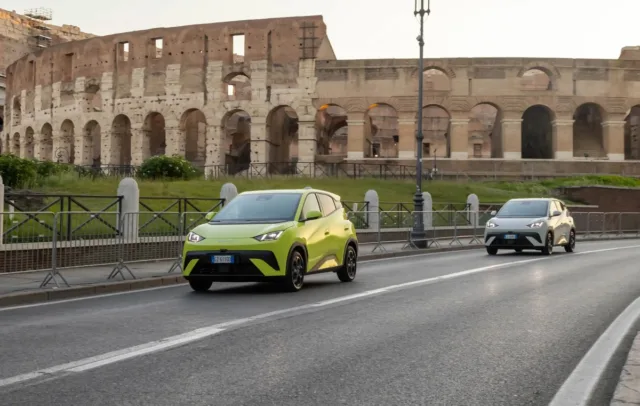
Sales of China’s giant BYD have surged year over year across Europe in September, with the company nearing sales figures of rival MG and US brand Tesla in the continent.
According to registration data compiled by Dataforce for Automotive News, Chinese automakers set a record for combined market share in Europe in September at 7.4%, which was mostly contributed by BYD, SAIC Motor‘s MG, and Chery.
A year ago, the market share of Chinese vehicles in Europe, including hybrids, petrol-powered and fully electric vehicles, had been 3.3% — implying a 149% increase.
These vehicles represented over 90,571 units in a total of 1.2 million cars sold across the continent — including markets in the EU, the EFTA countries and the UK.
State-owned SAIC Motor registered 33,556 vehicles in Europe, through its MG brand — which is originally British and was bought by the Chinese group in 2007.
MG — which produces models of all powertrains — is the best-selling Chinese brand in the continent.
BYD only expanded its passenger vehicle portfolio to European markets three years ago.
Up until then, the brand had been present in the continent through its electric buses, of which it began sales in 2014, in the Netherlands.
The company began local production of its commercial vehicles in Hungary in 2017.
It has since established its European headquarters there, while preparing to start manufacturing passenger vehicles in the country before the year end.
In September, the new energy vehicle (NEV) maker sold 24,336 vehicles in the Old Continent, a fivefold jump from a year ago.
Chery, which is present in the continent through its main brand, but also Jaecoo and Omoda, reached 18,545 vehicle sales in September, jumping from 2,688 in the prior year.
The company was the first Chinese automaker to produce vehicles locally, from November 2024, starting with the hybrid Ebro S700 — which is based on the Chery Tiggo 7.
Ebro is a Spanish EV maker launched in 2023, which was later acquired by also Spanish-based EV Motors SA, and with which Chery has formed a joint venture.
The JV began with the local assembly of vehicles in Spain — using the ‘Completely Knocked Down’ (CKD) system, Ebro assembled parts shipped from China in a former Nissan plant in Barcelona.
The companies currently produce three models, with the two others being based on Chery‘s Tiggo 4 and 8 models (and renamed Ebro S400 and S800).
The three automakers together represent about 83% of Chinese vehicle sales in Europe, according to Dataforce.
Most of the remaining share comes from Geely’s brands, which include its main marque, Lotus, Lynk & Co, Polestar, and Zeekr.
A few other Chinese manufacturers, such as XPeng or the premium brand Nio (and, more recently, its new sub-brand Firefly), also have a presence in the continent.
XPeng began last month producing EVs in Europe.
Through a partnership with the supplier and car manufacturer Magna Steyr, the Guangzhou-based brand rolled off the first vehicles in Graz, Austria.
The move allows the company to avoid the extra duties imposed a year ago by the European Commission on fully electric vehicles imported from China.
Earlier this year, Nio announced it is adopting the dealership business model in the new markets it is entering — a major shift from its previously direct-to-consumer model relying on flagship stores.
Data from the European Automobile Manufacturers’ Association (ACEA) showed that, from January 1 to August 31, BYD had sold 95,940 vehicles, tripling sales volumes from the same period in 2024.
Tesla, on the other hand, saw its registrations fall 32.6%, from 198,474 vehicles to 133,857 units in the first eight months of the year.
SAIC Motor outperformed the pure electric vehicle manufacturer, registering 192,433 vehicles between January and August, up from 160,800 in the prior year.
Dataforce further noted that the share of hybrid sales rose in September, contrary to fully electric vehicle registrations.
Plug-in hybrids, which represented 3% of Chinese vehicles in Europe in September 2024, have jumped to 29%, while hybrids increased from 13% to 21%.
Battery electric vehicles (BEV), which accounted for nearly half of Chinese vehicle sales in the continent last year, represented 32% in September 2025.
Last year, the EU imposed tariffs on Chinese electric vehicle imports after determining the industry received significant government subsidies, which led to unfair trade in the region.
BYD faces since late last year a 17.4% duty, Geely 20%, and SAIC 38.1%. These are on top of the existing 10% import duty, bringing the total levies to as much as 48.1% for SAIC.
Recently, several Chinese carmakers — such as Nio, Xpeng and Xiaomi — and auto suppliers have joined the China Chamber of Commerce to the EU’s Automotive Working Group (CCCEUAWG) to discuss EU policy trends.
Trade talks between the EU and China were reestablished in April, as Trump’s new tariffs took place.
By then, EU Trade Commissioner Šefčovič and China’s Commerce Minister Wang agreed to investigate the possibility of setting minimum prices for the imported EVs as an alternative to the duties.









